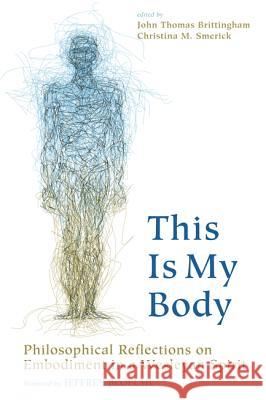This Is My Body » książka
This Is My Body
ISBN-13: 9781498207928 / Angielski / Miękka / 2016 / 178 str.
This Is My Body
ISBN-13: 9781498207928 / Angielski / Miękka / 2016 / 178 str.
(netto: 109,17 VAT: 5%)
Najniższa cena z 30 dni: 113,36
ok. 16-18 dni roboczych.
Darmowa dostawa!
The body of Christ. The body of the anorexic. The altered body. The mutilated body. The Eucharist. Canonical Western thought has had an uneasy relationship with the flesh from Plato forward. Western philosophy has spent its time dwelling upon ideation, perception, cognition, and recollection, and has pursued, de facto if not de jure, a duality of mind and body that continues to this day. Western theology has followed suit, either viewing the body as humiliation, prison, or site of sin. However, movements in the twentieth century--philosophical, theological, and scientific--have all issued challenges to the longstanding tradition. These challenges invite us to reconsider long-held beliefs about cognition, the body, and human experience in the world. In particular, Wesleyan theology and philosophy are called to address our inheritance and to move beyond it. This Is My Body provides a collection of essays addressing the body from broadly Wesleyan, Christian, and philosophical perspectives, examining Wesley's engagement with the body, embodied epistemologies, the body and the Church, and the altered body in relation to Christian Scripture, reason, tradition, and experience. ""This book is simply refreshing. Humbly calling Wesleyan theology to a deeper appreciation of the constitutive role that embodiment plays in all areas of human existence, this volume brings together continental philosophy, historical theology, and contemporary psychology in ways that are genuinely remarkable. It will not only enliven the contemporary scholarship, but enrich those individuals who aim to live in light of the physicality of a truly incarnational theology."" --J. Aaron Simmons, Associate Professor of Philosophy, Furman University ""Remarkably the body of this book offers dazzling contributions both to the cutting edge of philosophical enquiry and to the liveliest spirit of Wesleyan theology. Here these two rarely related approaches to the body come into intimate and timely resonance. Tangibly readable, invitingly teachable, its essays have been gathered in a rare solidarity of humor, honesty, and transdisciplinary wisdom."" --Catherine Keller, Professor of Constructive Theology, The Theological School, Drew University; author of The Cloud of the Impossible: Negative Theology and Planetary Entanglement John Thomas Brittingham is a Teaching Fellow at Greenville College in Illinois. He is the author of several essays engaging philosophy, embodiment, and popular culture. Christina M. Smerick is Associate Professor of Philosophy and Religion at Greenville College in Illinois. She is the author of Jean-Luc Nancy and Christian Thought: The Bodies of Christ, forthcoming from Lexington Books.
The body of Christ. The body of the anorexic. The altered body. The mutilated body. The Eucharist. Canonical Western thought has had an uneasy relationship with the flesh from Plato forward. Western philosophy has spent its time dwelling upon ideation, perception, cognition, and recollection, and has pursued, de facto if not de jure, a duality of mind and body that continues to this day. Western theology has followed suit, either viewing the body as humiliation, prison, or site of sin. However, movements in the twentieth century--philosophical, theological, and scientific--have all issued challenges to the longstanding tradition. These challenges invite us to reconsider long-held beliefs about cognition, the body, and human experience in the world. In particular, Wesleyan theology and philosophy are called to address our inheritance and to move beyond it. This Is My Body provides a collection of essays addressing the body from broadly Wesleyan, Christian, and philosophical perspectives, examining Wesleys engagement with the body, embodied epistemologies, the body and the Church, and the altered body in relation to Christian Scripture, reason, tradition, and experience.""This book is simply refreshing. Humbly calling Wesleyan theology to a deeper appreciation of the constitutive role that embodiment plays in all areas of human existence, this volume brings together continental philosophy, historical theology, and contemporary psychology in ways that are genuinely remarkable. It will not only enliven the contemporary scholarship, but enrich those individuals who aim to live in light of the physicality of a truly incarnational theology.""--J. Aaron Simmons, Associate Professor of Philosophy, Furman University""Remarkably the body of this book offers dazzling contributions both to the cutting edge of philosophical enquiry and to the liveliest spirit of Wesleyan theology. Here these two rarely related approaches to the body come into intimate and timely resonance. Tangibly readable, invitingly teachable, its essays have been gathered in a rare solidarity of humor, honesty, and transdisciplinary wisdom.""--Catherine Keller, Professor of Constructive Theology, The Theological School, Drew University; author of The Cloud of the Impossible: Negative Theology and Planetary EntanglementJohn Thomas Brittingham is a Teaching Fellow at Greenville College in Illinois. He is the author of several essays engaging philosophy, embodiment, and popular culture.Christina M. Smerick is Associate Professor of Philosophy and Religion at Greenville College in Illinois. She is the author of Jean-Luc Nancy and Christian Thought: The Bodies of Christ, forthcoming from Lexington Books.











